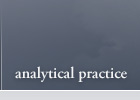Dr. Aziz on Huffington Post
Recent journal entries
- Finding Compassion: From an Ideal to Experiential Knowing – Dr. Aziz on The Times of India, Speaking Tree
- Meaningful Suffering versus Meaningless Suffering – Dr. Aziz on The Times of India, Speaking Tree
- the times of india invites dr. aziz to join the speaking tree
- dr. aziz and the syndetic paradigm go to india
journal categories
- Analytical Practice
- Business Consulting
- Publications
search robert aziz dot com
... Continued
Secular and religious ideals and ideologies, by contrast, carry us in the opposite direction. Indeed, much to the detriment of our unique consciousness needs today, secular and religious ideals and ideologies cause us to ascend, rather than to descend. They cause us to rise above and impose upon the life process, rather than descend into and move with it. "The history of the secular and religious ideologies of humanity," I write in The Syndetic Paradigm: The Untrodden Path Beyond Freud and Jung, "is a legacy of having imposed on life, through fixed or concretized form, false absolutes and false certainties; and the imposition on life, through fixed or concretized form, of false absolutes and false certainties is always an act of violation of the soul. Perhaps even up to one hundred years ago, this formula could have been believed in and lived with relative authenticity, in spite of its ultimate destructiveness. Today, however, it cannot. There truly is an evolution of consciousness and thus what falls within the range of acceptability in one age becomes, or is on its way to becoming, a virtually intolerable condition in the next." (pp.292–93)
For people today, I have been led to conclude on the basis of over twenty–four years of clinical observation and over 30 years of related research, when it comes to the need for depth, psychological and spiritual meaning, secular and religious ideals and ideologies constitute no viable alternative to the experience of a direct, on–going encounter with self–organizing nature in process. The imposition on life of false absolutes and false certainties is always an act of violation of the soul because, amongst other things, such imposition will only speak to and reinforce the very problem of will and ego control from which our psychological and spiritual well–being most desperately requires us to be released. False absolutes and false certainties in the form of secular and religious ideals and ideologies violate our souls because they remove us from the very process that must necessarily be the basis of our direct encounter with unfolding Reality.
We can use as an example of the incongruity between ideal and process, the psychological and spiritual notion of compassion. When it comes to the dynamics of meaning, there clearly is a big difference between trying to feel compassion for someone as an act of will because one has been directed to do so by a religious ideal, and genuinely feeling compassion for another based on an actual experience of being able to identify with that individual in his or her struggle. In the first instance, there is no direct encounter between two human beings. In the first instance, consciousness does not come into play, either internally or interpersonally. In short there is no significant human engagement in process, either inwardly or outwardly. Rather, in the name of spiritual goodness, an individual is simply being overlaid with an ideal. In the second instance, by contrast, where one is able to identify with another, the emergence of compassionate feeling necessarily takes the form of a human engagement, internally and interpersonally. In the second instance, in contrast to the first one, consciousness necessarily comes into play. Indeed, in the second instance, the precise challenge being faced by the one individual needs not only to be identified by the other individual, but that individual must then in turn find within himself or herself a point of personal reference to that particular experience. Of course it is here that one's level of self–knowledge, one's consciousness level, especially comes into play. So how do we get to such a place of understanding and deep connection to ourselves and others? We get to this place by honestly and deeply exploring ourselves under the direction of self–organizing nature. Such insight might come to us through prayer and meditation. It might also come to us through insight–oriented, psychotherapeutic techniques, such as dream analysis. However it comes to us, the main thing to understand is that insight into our conscious and unconscious selves will necessarily take the form of us facing directly and honestly that which we would most wish to avoid. Success will depend entirely on our ability to bring to consciousness and accept about ourselves that which we would otherwise choose to reject.
There can be no question that our ability to identify with another's struggle establishes a heartfelt point of connection by way of process—a heartfelt experience of compassion at which we would have never arrived by way of the mere willful imposition of an ideal. People certainly can be most unforgiving when looking at the shortcomings of others. Harsh judgments and even anger readily present under such circumstances without anyone stopping to think for a moment about the existence of their own less dramatic, but nonetheless comparable limitations. "Why," I have been asked by individuals filled with utter contempt for the addictive behaviors of a friend, "can he not end the self–destructive pattern?" ‘Can you not imagine," I respond, "a behavior or orientation in your own life that you knew needed to change and you in fact wished to change, but were unable to change, even to this day." As my analysand's countenance suddenly softens, I add: "Changing fundamental behaviors, those behaviors that present the most significant obstacles to our psychological and spiritual journey, is never an easy piece of work for anyone." And it is at that moment we descend. It is at that moment we not only feel compassion for that other individual through our ability to identify with, but it is at that moment we hold consciousness on self–organizing nature's compassionate, unconditional support of all of us. No matter how often we fail to advance, no matter how often we lose ground and even regress, the compassionate support offered us by way of self–organizing nature remains unwavering. So how, our ever–deepening silence now tacitly acknowledges, could our support of anyone else be any less generous, any less forgiving, any less compassionate?
trackbacks
The trackback URL for this entry is:
https://www.robertaziz.com/cgi-bin/mt/mt-tb.cgi/10






